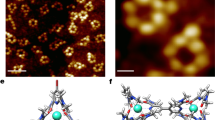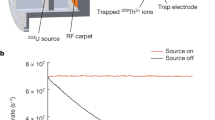Abstract
EVEN ten years ago, physicists were well aware that the utilization of atomic energy could not be realized without a fundamental extension of scientific knowledge. In spite of the remarkable progress in experimental nuclear physics which followed the introduction of high-voltage equipment and the invention of the cyclotron, no physical phenomenon was known, even as late as 1937, which offered the remotest possibility of exploiting the enormous quantities of energy lying latent in atomic nuclei.
This is a preview of subscription content, access via your institution
Access options
Subscribe to this journal
Receive 51 print issues and online access
$199.00 per year
only $3.90 per issue
Buy this article
- Purchase on Springer Link
- Instant access to full article PDF
Prices may be subject to local taxes which are calculated during checkout
Similar content being viewed by others
References
Naturwiss., 27, 11 (1939).
Nature, 143, 470 (1939).
Naturwiss., 27, 402 (1939).
Nature, 143, 239 (1939).
Z. Phys. 119, 696 (1942).
Z. Phys., 120, 450 (1943).
Z. Phys., 119, 568 (1942).
Z. Phys., 122, 749 (1944).
Z. Phys., 122, 769 (1944).
Author information
Authors and Affiliations
Rights and permissions
About this article
Cite this article
HEISENBERG, W. Research in Germany on the Technical Application of Atomic Energy*. Nature 160, 211–215 (1947). https://doi.org/10.1038/160211a0
Issue Date:
DOI: https://doi.org/10.1038/160211a0
Comments
By submitting a comment you agree to abide by our Terms and Community Guidelines. If you find something abusive or that does not comply with our terms or guidelines please flag it as inappropriate.



